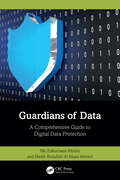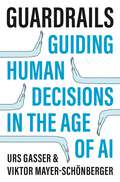- Table View
- List View
Größen, Einheiten, Formelzeichen: Hilfen zum Erstellen naturwissenschaftlicher Texte (essentials)
by Torsten SchmiermundSie müssen einen naturwissenschaftlich-technischen Aufsatz schreiben und stehen nun vor dem Problem, ihre wenigen Formeln und Gleichungen korrekt darstellen zu wollen? Sie besitzen bereits Bücher zum Thema „Schreiben einer wissenschaftlichen Arbeit“, möchten zusätzlich aber erfahren, wie Sie bestimmte Sonderzeichen erzeugen können? Sie kennen sich in der Materie schon ganz gut aus, möchten aber regelkonform schreiben? Dieses essential liefert Ihnen Antworten in komprimierter Form. Neben allgemeinen Tipps erhalten Sie auch solche für das Arbeiten mit MS Word und darüber hinaus Informationen zum Umgang mit MS Excel, MS Powerpoint, OpenOffice und LibreOffice.
Guardians of Data: A Comprehensive Guide to Digital Data Protection
by Nik Zulkarnaen Khidzir Shekh Abdullah-Al-Musa AhmedThis book helps to reduce the risk of data loss by monitoring and controlling the flow of sensitive data via network, email, or web. Guardians of Data also shows guidance about data protection that data is not corrupted, is accessible for authorized purposes only, and is in compliance with applicable legal or regulatory requirements.Guardians of data means protecting data, networks, programs, and other information from unauthorized or unattended access, destruction, or change. In today’s world, guardians of data are very important because there are so many security threats and cyber-attacks. For data protection, companies are developing cybersecurity software.The primary goal of data protection is not just to safeguard sensitive information but to ensure it remains accessible and reliable, thus preserving trust and compliance in data-centric operations. While data protection laws set out what should be done to ensure everyone’s data is used properly and fairly, data protection is a backup solution that provides reliable data protection and high accessibility for rapidly growing business data. Data protection offers comprehensive backup and restoration of functionality specifically tailored for enterprises and distributed environments.
Guardrails: Guiding Human Decisions in the Age of AI
by Viktor Mayer-Schönberger Urs GasserHow society can shape individual actions in times of uncertaintyWhen we make decisions, our thinking is informed by societal norms, &“guardrails&” that guide our decisions, like the laws and rules that govern us. But what are good guardrails in today&’s world of overwhelming information flows and increasingly powerful technologies, such as artificial intelligence? Based on the latest insights from the cognitive sciences, economics, and public policy, Guardrails offers a novel approach to shaping decisions by embracing human agency in its social context.In this visionary book, Urs Gasser and Viktor Mayer-Schönberger show how the quick embrace of technological solutions can lead to results we don&’t always want, and they explain how society itself can provide guardrails more suited to the digital age, ones that empower individual choice while accounting for the social good, encourage flexibility in the face of changing circumstances, and ultimately help us to make better decisions as we tackle the most daunting problems of our times, such as global injustice and climate change.Whether we change jobs, buy a house, or quit smoking, thousands of decisions large and small shape our daily lives. Decisions drive our economies, seal the fate of democracies, create war or peace, and affect the well-being of our planet. Guardrails challenges the notion that technology should step in where our own decision making fails, laying out a surprisingly human-centered set of principles that can create new spaces for better decisions and a more equitable and prosperous society.
Gudetama Cross-Stitch: 30 Easy-to-Follow Patterns from Your Favorite Lazy Egg
by Sosae Caetano Dennis CaetanoGudetama Cross-Stitch combines cross-stitching fun with 30 easy-to-follow patterns inspired by everyone's favorite lazy egg with the can't-be-bothered attitude. Gudetama&’s name literally translates to &“lazy egg,&” and it&’s how we all feel sometimes when it comes to, well, pretty much anything. But if you&’re the kind of person who doesn&’t have time for complicated crafts or dealing with other people, then this collection of 30 Gudetama-inspired designs are just for you. First, you&’ll learn cross-stitching basics including tools and techniques and how to read a cross-stitch chart. Then you&’ll apply your new skills to a range of hilarious and lovable patterns organized into chapters like Lazy, Medium-Lazy, and Pay Attention—depending on how sluggish or motivated you&’re feeling. Finally, you&’ll be able to apply your masterpieces to projects like gift tags, greeting cards, and ornaments. Whether you&’re an experienced cross-stitcher or new to the craft, you&’ll find a variety of poses and patterns in this book that are accessible and easy to learn. With a little patience and practice, anyone can bring these Gudetama-inspired masterpieces to life. And if not, just take a nap.
Guerilla Data Analysis Using Microsoft Excel
by Oz Du Soleil Bill JelenThis book includes step-by-step examples and case studies that teach users the many power tricks for analyzing data in Excel. These tips have been honed by Oz du Soleil, a former financial analyst charged with taking mainframe data and turning it into useful information quickly, and “Mr. Excel” himself, Bill Jelen. Topics include data quality, validation, perfectly sorting with one click, matching lists of data, data consolidation, data subtotals, pivot tables, pivot charts, tables, and much more. This new edition has been updated for Excel 2013.
Guerrilla Marketing: Advertising and Marketing Definitions, Ideas, Tactics, Examples, and Campaigns to Inspire Your Business Success
by Jay Conrad Levinson Jason Myers Merrilee KimbleFocused on low-cost, strategic marketing concepts that will creatively promote a compelling product or service, Guerrilla Marketing’s winning approach relies on knowledge, time, energy, and imagination rather than a big marketing budget. Now, the winning continues with Guerrilla Marketing Volume 2.
Guessing Random Additive Noise Decoding: A Hardware Perspective
by Warren J. Gross Syed Mohsin Abbas Marwan JalaleddineThis book gives a detailed overview of a universal Maximum Likelihood (ML) decoding technique, known as Guessing Random Additive Noise Decoding (GRAND), has been introduced for short-length and high-rate linear block codes. The interest in short channel codes and the corresponding ML decoding algorithms has recently been reignited in both industry and academia due to emergence of applications with strict reliability and ultra-low latency requirements . A few of these applications include Machine-to-Machine (M2M) communication, augmented and virtual Reality, Intelligent Transportation Systems (ITS), the Internet of Things (IoTs), and Ultra-Reliable and Low Latency Communications (URLLC), which is an important use case for the 5G-NR standard. GRAND features both soft-input and hard-input variants. Moreover, there are traditional GRAND variants that can be used with any communication channel, and specialized GRAND variants that are developed for a specific communication channel. This book presents a detailed overview of these GRAND variants and their hardware architectures. The book is structured into four parts. Part 1 introduces linear block codes and the GRAND algorithm. Part 2 discusses the hardware architecture for traditional GRAND variants that can be applied to any underlying communication channel. Part 3 describes the hardware architectures for specialized GRAND variants developed for specific communication channels. Lastly, Part 4 provides an overview of recently proposed GRAND variants and their unique applications.This book is ideal for researchers or engineers looking to implement high-throughput and energy-efficient hardware for GRAND, as well as seasoned academics and graduate students interested in the topic of VLSI hardware architectures. Additionally, it can serve as reading material in graduate courses covering modern error correcting codes and Maximum Likelihood decoding for short codes.
Guia Blossom Blast Saga
by Hiddenstuff Entertainment Leonardo MagalhãesGuia de Dicas e Estratégia Avançada. Este é o guia mais abrangente e detalhado da internet. Disponível para download imediato em seu celular, dispositivo de eBook, ou brochura. Com o sucesso das centenas de guias e estratégias, escrevi outro guia profissional avançado para jogadores novos e veteranos. Este oferece estratégias e dicas específicas sobre como progredir no jogo, derrotar seus oponentes, adquirir mais moedas, e muito mais! Eis o que você terá ao comprar este guia profissional detalhado e avançado. - Dicas e Estratégias Profissionais. - Truques e Macetes. - Segredos, Dicas, Macetes e Truques usados por jogadores experientes! - Como conseguir várias moedas. - E MUITO MAIS! Todas as versões deste guia possuem imagens de tela para lhe ajudar a entender melhor o jogo. Nenhum outro guia é tão abrangente e avançado como este. Você irá gostar de ter comprado este guia, e terá muitos benefícios em comparação a outros guias menos eficazes por aí. Compre agora e destrua seus oponentes! Torne-se um Jogador Experiente Hoje! Para suporte e mais informações sobre nossos produtos, visite: http://www.hiddenstuffentertainment.com/.
Guia No Oficial del Juego el Arrecife de Nemo
by Adriana Rojas The YuwGuía avanzada de tips y estrategias. Esta es la única guía más comprensible y detallada que podrás encontrar en línea. Disponible para descargarse instantáneamente en tu teléfono móvil, equipo de libros electrónicos, o en un formato de papel. Con el éxito de cientos de otras guías escritas y estrategias que he escrito otra guía profesional avanzada para jugadores nuevos y veteranos. Esta da estrategias específicas y tips en cómo avanzar en el juego, vencer a tu oponentes, adquirir más moneras y dinero, mas ¡muchas otras cosas! - Tips y estrategias profesionales. - Trucos y consejos. - ¡Secretos, Tips, Mañas, Desbloqueadores, and Trucos usados por los jugadores profesionales! - Como obtener miles de Dinero/Monedas. - ¡Y MUCHO MÁS! Todas las versiones de esta guía tiene impresiones de pantalla para ayudarte a un mayor entendimiento del juego. No hay otra guía que sea tan comprensible y avanzada como esta.
Guia Não Oficial do Jogo Candy Crush Jelly Saga
by Débora L. Sousa Hiddenstuff EntertainmentPasse níveis, obtenha power-ups e a pontuação máxima! *GUIA NÃO OFICIAL* Além de comprar este e-book, fique à vontade para se inscrever no nosso programa suplementar de guias gratuitos. Ao copiar o link abaixo, você terá acesso às atualizações mais recentes dos aplicativos e videogames online mais populares. Inscreva-se gratuitamente abaixo: http://emailsignupform.subscribemenow.com/ Guia Avançado de Dicas e Estratégias. Este é o guia mais completo e detalhado que você encontrará online. Disponível para download instantâneo no seu celular, dispositivo para e-books ou em formato impresso. Com o sucesso das minhas centenas de outros guias e estratégias, resolvi escrever outro guia profissional avançado para os jogadores novos e veteranos. Ele apresenta estratégias e dicas específicas sobre como avançar no jogo, derrotar os seus adversários, adquirir mais moedas e dinheiro e muito mais! Você receberá o seguinte quando comprar este guia de jogo profissional avançado e detalhado: - Dicas e estratégias profissionais - Trapaças e hacks - Segredos, dicas, trapaças e truques usados por jogadores profissionais - Como ganhar muito dinheiro/moedas - E MUITO MAIS! Todas as versões deste guia têm capturas de tela para ajudar a entender melhor o jogo. Não existe outro guia tão completo e avançado como este. Você agradecerá por ter comprado este guia e será bastante beneficiado quando comparado com outros guias menos eficazes por aí. Compre agora e derrote os seus adversários! Torne-se um jogador profissional hoje mesmo! Para suporte e mais informações sobre os nossos produtos, favor visitar: http://www.hiddenstuffentertainment.com/ Termo de responsabilidade: Este produto não está associado, afiliado, apoiado, certificado ou patrocinado pelo Proprietário Original dos Direitos Autorais. Todas as marcas registradas que aparecem nes
Guia Não Oficial do Jogo Candy Crush Soda Saga
by Joshua Abbott Renato Santana dos SantosVença Níveis, Obtenha Power-Ups e as Melhores Pontuações! Com o meu Guia de Jogo Completo do Candy Crush Soda Saga você aprenderá absolutamente tudo sobre o jogo! As estratégias mencionadas neste guia são conhecidas apenas pelos jogadores de elite com as melhores pontuações. Meu guia abrange o seguinte: - Visão geral e informações básicas sobre o Candy Crush Saga. - Itens e Combos úteis, e o que eles fazem. - Como conseguir mais Vidas. - As melhores combinações de doces para vencer os níveis e conseguir altas pontuações. - Estratégias para todos os tipos de nível. Como vencer qualquer nível! - Segredos, dicas e truques usados pelos jogadores profissionais! - Instruções detalhadas passo a passo! - Estratégias gerais de jogabilidade. - E MUITO MAIS! Compre agora e nunca mais fique preso tentando vencer um nível, ou sem vidas! Torne-se um Jogador com excelente pontuação Hoje! Este produto não é associado, afiliado, endossado ou patrocinado pela King ou Midasplayer.com Limited, e tampouco foi revisado, testado ou certificado por eles. Este guia deve ser usado como referência. Isto não modifica ou altera o jogo de nenhuma maneira. Este é um guia escrito, e não um programa de software.
Guia Não Oficial do Jogo Halo 5 Guardians
by Joshua Abbott André de Oliveira GarciaDescrição: *Versão do Guia Não Oficial* Guia com dicas e estratégias avançadas. Este é o guia mais abrangente e o mais detalhado que você encontrará online. Disponível para download instantâneo no seu celular, em leitores de livros digitais ou em edição de bolso. Abaixo está alistado o que você vai conseguir quando comprar este guia profissional, avançado e detalhado. -Dicas e Estratégias Profissionais -Cheats e Hacks -Segredos, Dicas, Truques, Desbloqueios e Técnicas Usadas por Jogadores Profissionais! -Como Conseguir Muito Dinheiro/Coins -E MUITO MAIS! Isenção de Responsabilidade: Este produto não está associado, afiliado, endossado, certificado ou patrocinado pelo Proprietário Original dos Direitos Autorais. Todas as marcas registradas que aparecem neste e-book são de propriedade de seus respectivos proprietários.
Guia Não-Oficial de Pokémon Omega Ruby e Alpha Sapphire
by Joshua Abbott Guilherme De Oliveira*GUIA NÃO-OFICIAL* Além de comprar este eBook, sinta-se livre para registrar seu email para o programa de guia suplementar gratuito. Copiando o link abaixo você ganha acesso as atualizações mais recentes sobre os jogos mais populares, apps mobile e dispositivos da atualidade! Registre-se gratuitamente abaixo: http://emailsignupform.subscribemenow.com/ Dicas Avançadas & Guia de Estratégias. Este é o mais detalhado e compreensível guia que você encontrará online. Disponível para download instantâneo no seu smartphone, tablet ou leitor de eBooks. Com o sucesso das minhas centenas de guias e estratégias que eu escrevi antes para jogadores iniciantes e veteranos. Este dá estratégias específicas e dicas em como progredir no jogo, vencer seus oponentes, adquirir mais dinheiro e muito mais! Aqui vai o que você vai encontrar quando comprar este guia professional avançado e detalhado: - Dicas e Estratégia Professionais; - Cheats e Hacks; - Segredos, Dicas, Cheats, Desbloqueáveis, e Truques utilizados por jogadores profissionais; - Como conseguir muito dinheiro; - E MUITO MAIS! Você ficará feliz que comprou este guia e se beneficiará dele muito mais se comparado a outros guias menos eficazes por aí. Compre agora e destrua seus oponentes! Torne-se um jogador profissional hoje! Para suporte técnico e mais informações sobre nossos produtos, acesse: http://www.hiddenstuffentertainment.com/ Aviso: Este produto não é associado, afiliado, endossado, certificado, ou patrocinado pelos Donos Originais dos Direitos Autorais. Todas as mascas registradas presentes nesse guia são de propriedade de seus respectivos donos.
Guia Pokémon GO + 20 dicas e truques que você deve ler
by Fernanda Ranieri Silva Game GuidezSeja o melhor treinador Pokémon você pode ser! Em nosso guia, mergulhamos diretamente nas dicas e truques que o ajudarão a se tornar um mestre no menor tempo possível. Nós o guiamos de mãos dadas com algumas das dicas mais cobiçadas e truques descobertos no jogo até agora. Se você quiser acelerar a sua diversão, este é o livro para ir para você! Alguns dos tópicos que abordamos: Começando Encontrando mais pokémons Nivelamento mais rápido e mais eficiente Como encontrar Pokémon em uma equipe Como economizar bateria com estratégias avançadas Itens Dicas e truques de Realidade Aumentada Dicas especiais do Pokéstop Segredos e sugestões Também estão incluídos muito mais dicas, truques e segredos. Se você quiser ler nenhuma enrolação e apenas chegar direto ao ponto, este é o livro para você! Leia a sua cópia hoje e torne-se o mestre que você é!
Guia Prático das Câmeras GoPro Hero e Fusion: Como usar a sua GoPro Fusion e Hero 4/5/6/7 disponíveis em Black e White
by Brad JohnsonAprenda a usar a sua câmera GoPro como um profissional! Este guia é para quem procura capturar vídeos incríveis em seu dispositivo GoPro. Compatível com GoPro Fushion, Hero 4,5,6 e 7. Este livro aborda tudo o que você precisa saber: - Tirar fotos e vídeos incríveis - Fotos de lapso de tempo - Fotografia em movimento - Compartilhando seus vídeos e fotos - Fotografia subaquática - Composição das filmagens - Uso da bateria - Resolução e campo de visão - Uso do estabilizador Gimbal - Técnicas de edição de vídeo - E MAIS!
Guia de Jogo Agar.io
by Hiddenstuff Entertainment Rafael da Silva RamaGuia Não-Oficial do Agar.io por HiddenStuff Entertainment Passa Níveis & Ganha Poderes! *GUIA NÃO-OFICIAL* Para além de comprares este eBook, inscreve-te também no nosso programa suplemento de guia grátis. Ao copiares o link que se encontra em baixo, terás acesso às novidades mais recentes relativas às aplicações e aos videojogos. Inscreve-te gratuitamente em baixo: http://emailsignupform.subscribemenow.com/ Dicas Avançadas & Guia Estratégico. Este é o único guia abrangente e detalhado que encontrarás online. Disponível para download instantâneo no dispositivo eBook do teu telemóvel ou em formato brochura. Com o sucesso das minhas centenas de outros guias e estratégias escritos, escrevi outro guia profissional avançado para jogadores novos e veteranos. Este oferece estratégias e dicas específicas para avançares no jogo, derrotares os teus adversários, adquirires mais moedas e dinheiro, e muito mais! Aqui está o que obterás quando comprares este guia profissional e detalhado - Dicas e Estratégias Profissionais. - Cheats e Hacks. - Segredos, Dicas, Desbloqueadores e Truques Usados Por Jogadores Profissionais! - Como Ganhar Muito Dinheiro/Moedas. - E MUITO MAIS! Todas as versões deste guia têm imagens para te ajudar a entenderes melhor o jogo. Não existe nenhum guia que seja tão abrangente ou avançado como este. Ficarás satisfeito ao comprares este guia e ganharás muito mais com ele do que com outros guias muito menos eficazes. Compra agora e esmaga os teus adversários! Torna-te um Jogador Profissional ainda HOJE! Se precisares de ajuda ou mais informações relativamente aos nossos produtos, visita: http://www.hiddenstuffentertainment.com/ Aviso: Este produto não está associado, afiliado, aprovado, certificado ou financiado pelo Dono Original dos Direitos de Autor. Todas
Guia de Segurança & Backup para PCs: Como Proteger e Fazer Backup do Seu PC com Software Antivírus e Malware
by Jon AlbertUm guia detalhado para aprender tudo sobre segurança e backup do PC Este guia o ajudará a proteger seu computador de vírus, manter-se seguro na Internet e obter software gratuito de segurança online Com base em macetes fáceis, este livro irá ensinar-lhe sobre: - Antivírus malware firewall backup - download de software gratuito - Microsoft security essentials - Software de proteção gratuita Avast - Software de firewall - Spyware e Adware - Como usar bloqueadores de pop-up - Alternativas gratuitas de backup - Armazenamento na Internet - Software de recuperação Se você quer proteger seu computador contra malware, então este livro é para você. --> Role para o alto da página e clique em adicionar ao carrinho para comprar instantaneamente Isenção de Responsabilidade: O autor e/ou detentor dos direitos não fazem quaisquer exigências, promessas ou garantias sobre a precisão, completude ou adequação do conteúdo deste livro e expressamente eximem-se de responsabilidade por erros e omissões no aqui contido. Este é um produto apenas para referência.
Guia de la felicidad, ¿o no?
by Bryan Skabeche Eddy Skabeche¡Qué onda amigxs de SKabeche! ¿Cómo va la vida?, ¿qué se siente entrar a la adolescencia de golpe? ¿ya te respondió tu crush o te dejó en visto? Vivir no es sencillo. Crecer tampoco. Mucho menos llegar a una nueva SKuela o convivir con tus hermanxs. Por eso creamos esta Guía de la felicidad. Un libro que si en este instante no te hace la existencia más fácil, ten por seguro que la hará más divertida con muchas de nuestrasmejores experiencias, bromas y consejos para que jamás decaiga el ánimo. Mientras conoces más sobre nosotros (Eddy y Bryan) y sobre ti mismo. Reúne a tu SKuad y prepárense para hacer los retos más divertidos, locos y virales que los llevarán a disfrutar la vida desde otra perspectiva, dentro y fuera del mundo digital.
Guia de uso do Software de Reconhecimento de Voz para escritores
by Barbara WatkinsonGuia de uso do Software de Reconhecimento de Voz para escritores, Como digitar mais rápido e Ditar no Windows e MAC por Barbara Watkinson Você quer escrever seu romance de forma mais rápida e eficaz? Se você respondeu sim, então este manual é para você! Você sabia que o software de ditado pode ajudá-lo a escrever seu livro até 3 vezes mais rápido? Este guia é possui toneladas de estratégias para ditar seu romance, tudo a partir do conforto da sua sala de estar e sem tocar no teclado! Aqui estão os tópicos que estão incluídos nesse livro: Como começar Como se preparar o esboço O melhor discurso para aplicativos de texto Como usar o software de ditado para publicar um romance + MUITO MAIS! Se você quer aprender a escrever seu romance falando, este livro é para você! -> Role até o topo da página e clique em adicionar ao carrinho para comprar instantaneamente Aviso Legal: Este autor e / ou proprietário (s) de direitos não fazem reivindicações, promessas ou garantias sobre a exatidão, integridade ou adequação do conteúdo deste livro, e expressamente se isenta da responsabilidade por erros e omissões nos conteúdos nele contidos. Este produto é apenas para referência. Gênero: COMPUTADORES / Documentação e Redação Técnica Gênero secundário: COMPUTADORES / Processamento de voz e áudio Língua: Português Brasil Contagem de palavra: 2422 Links de livros: Amazon
Guia do Jogo 8 Ball Pool
by Joshua Abbott Márcia de Medeiros Souza*GUIA NÃO OFICIAL* Dicas avançadas e guia de estratégia. Esta é o guia com mais informações e o mais detalhado que encontrará online. Disponível para download instantâneo em seu telefone, eBook ou em paperback. Com o sucesso de centenas de outros guias online e estratégias, escrevi este guia profissional avançado para novatos e veteranos. Ele mostra estratégias específicas e dicas de como progredir no jogo, vencer seus oponentes, ganhar moedas e dinheiro e muito mais! - Dicas e estratégias profissionais. - Hacheio o jogo. - Dicas secretas, hacks, desbloqueios e truques usados pelos jogadores Pro! - Como conseguir toneladas do dinheiro/moedas. - E MUITO MAIS! Todas as versões deste guia têm prints de tela que lhe ajudarão a entender o jogo. Não há nenhum outro guia tão detalhado e com mais informações.
Guia do Jogo Clash of Clans
by Joshua Abbott Juliana Dias BorgesVença os seus adversários! *Versão do Guia Não-Oficial* Além de comprar este eBook sinta-se livre para inscrever-se para o nosso programa suplementar do guia grátis. Copiando o link abaixo você terá acesso às últimas atualizações para os mais populares aplicativos online e jogos de vídeo. Registe-se gratuitamente abaixo: http://emailsignupform.subscribemenow.com/ Dicas avançadas & Guia de Estratégia. Este é o guia mais completo e detalhado que você vai encontrar online. Disponível para download imediato em seu telefone móvel, dispositivo de e-book, ou em forma de livro. Com o sucesso dos meus centenas de outros guias e estratégias escrevi, escrevi um outro guia profissional avançado para os jogadores novos e veteranos. Isto dá estratégias e dicas específicas sobre como progredir no jogo, vencer os seus adversários, adquirir mais moedas e dinheiro, e muito mais! Aqui está o que você vai ter quando você compra este guia jogo profissional avançada e detalhada. - Dicas profissionais e Estratégias. - Códigos e Macetes. - Segredos, Dicas, Cheats, Destraváveis e truques usados pelos jogadores profissionais! - Como conseguir toneladas de dinheiro / Moedas. - E MUITO MAIS! Todas as versões deste guia tem imagens para ajudar você a entender melhor o jogo. Não há nenhum outro guia que é tão abrangente e avançado como este. Se você está procurando guias sobre outros jogos populares e títulos de aplicativos sinta-se livre para procurar outros títulos por Joshua J Abbott ou HSE Games. Você estará feliz que você comprou este guia e irá beneficiar-se muito com ele em comparação com os outros guias menos eficazes por aí. Compre agora e esmague seus adversários! Torne-se um Jogador Profissional Hoje! Para suporte e obter mais informações sobre nossos produtos, visite: http://www.hiddenstuffentertainment.com/ Aviso Legal: Este produto não está ass
Guia do Microsoft Surface Tablet Go Pro 3, 4, & 5: Como Usar, Dicas e Truques (Versão Não Oficial)
by Bob BabsonIntrodução, Configuração, Como usar, Dicas, Truques, Acessórios e muito mais! Descrição do livro: Você usa o seu dispositivo Microsoft Surface regularmente? Deseja aprender a usar o seu dispositivo Microsoft Surface como ninguém e economizar tempo? Compatível com todas as versões Go e Pro 2, 3 e 4. Se você respondeu sim a alguma dessas perguntas, este guia é para você. Você sabia que o seu dispositivo Microsoft Surface é capaz de milhares de funções, o que facilitará sua vida e permitirá que você economize mais tempo. No entanto, como existem muitas funções secretas, pode ser difícil saber exatamente como usar seu dispositivo de forma otimizada. O que está incluído: -Como configurar. -Como navegar. Recursos de dispositivos. -Como economizar tempo. -Como economizar esforço e concluir tarefas com facilidade. -Saiba como usar seu dispositivo como os profissionais. -Resolver problemas. + MUITO MAIS! Se você quiser aprender a usar o dispositivo como ninguém, este guia é para você. -> Role até o topo da página e clique em adicionar ao carrinho para comprar instantaneamente Aviso Legal: Este autor e ou o(s) proprietário(s) dos direitos não faz reivindicações, promessas ou garantias com relação à precisão, integridade ou adequação do conteúdo deste livro e se isenta expressamente da responsabilidade por erros e omissões no conteúdo deste. Este produto é apenas para uso de referência. Consulte um profissional antes de agir sobre qualquer um dos conteúdos encontrados nele.
Guia do Usuário não Oficial do Chromebook: O Guia Completo para Aplicativos, Configuração, Ferramentas, Dicas, Uso do Dispositivo e Muito Mais
by Bob BabsonGuia do usuário não oficial do Chromebook: o guia completo para aplicativos, configuração, ferramentas, dicas, uso do dispositivo e muito, Este material guia é para referência pessoal será de grande utilidade e benéfico para seu aperfeiçoamento, habilidades e conhecimento do item descrito.
Guia não-oficial para Pokémon GO
by Joshua Abbott Thaís Vidal e Rodrigo RadeticGuia não-oficial para Pokémon GO por Joshua Abbott Vença os seus adversários! *GUIA NÃO OFICIAL* Dicas Avançadas & Guia de Estratégia. Este é o mais abrangente e o único guia detalhado que você vai encontrar online. Disponível para download imediato em seu celular, leitor de eBook, ou em formato brochura. Com o sucesso de centenas de outros guias de estratégia escritos, eu escrevi outro guia avançado profissional para jogadores novos e veteranos. Ele dá estratégias e dicas específicas em como progredir no jogo, vencer seus adversários, adquirir mais moedas e muito mais! - Dicas profissionais e estratégias. - Cheats e Hacks. - Segredos, dicas, cheats, desbloqueáveis, e truques usados pelos jogadores profissionais! - Como conseguir muito dinheiro/moedas. - E MUITO MAIS! Todas as versões desse guia possui screenshots para ajudá-lo a compreender melhor o jogo. Não há outro guia tão abrangente e avançado quanto este. Aviso: Este produto não é associado, afiliado, aprovado, certificado ou patrocinado pelos Originais Detentores dos Direitos Autorais.. Gênero: JOGOS / Vídeo e Eletrônicos Sub-gênero: JOGOS / Referência Idioma: Português Número de Palavras: 3000
Guia para Começar a Fazer Dinheiro com O Bitcoin
by Adidas Wilson John Klebison FerreiraO Bitcoin é uma criptomoeda e um sistema de pagamentos digital criado por um programador desconhecido, ou por um grupo de programadores, sob o nome de Satoshi Nakamoto. Foi lançado como software open-souce em 2009. É um sistema peer-to-peer (ponto-a-ponto), e as transações ocorrem diretamente entre usuários sem a necessidde de um intermediário. Essas transações são verificadas por nodos de rede e registradas em uma espécie de livro público conhecido como blockchain. Uma vez que sistema funciona sem a intervensão de uma entidade central ou administrador superior e único, o bitcoin é chamado de primeira moeda digital descentralizada. Além de poder ser criado como recompensa pela mineração, o bitcoin pode ser trocado por outras moedas, produtos e serviços em qualquer tipo de de mercado.
























